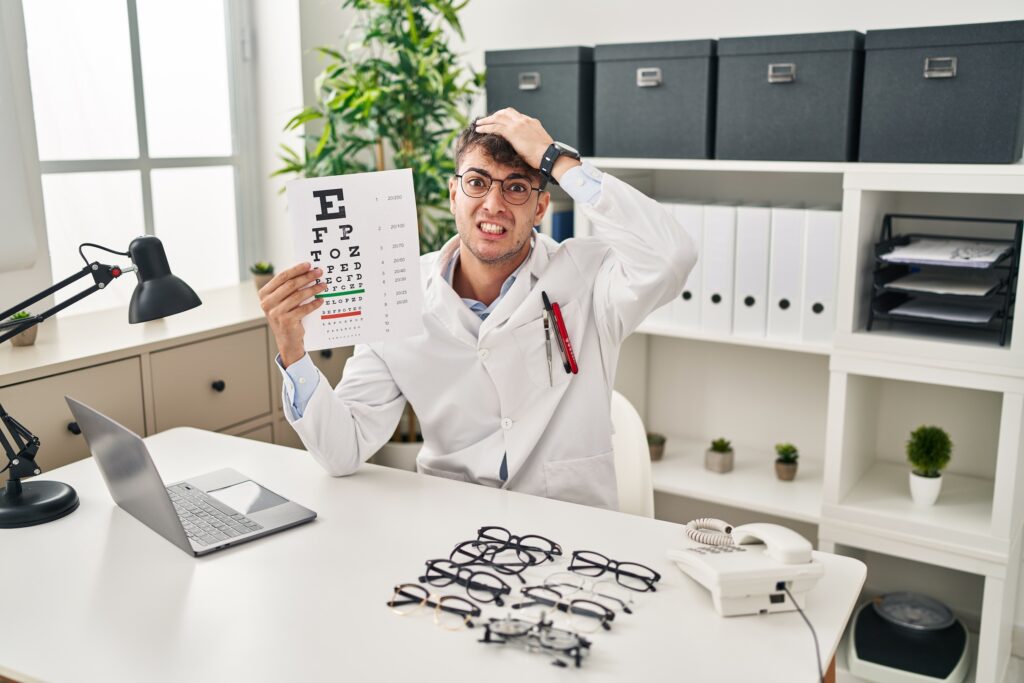Every year, the second Thursday of October is marked as World Sight Day, a global initiative dedicated to raising awareness about eye health, vision impairment, and the vital role eye care professionals play in our communities. In 2025, this important day falls on October 9th, and it offers an opportunity for everyone – from patients to practitioners – to focus on the importance of protecting and improving vision.
This blog explores the importance of World Sight Day, highlights the vital role of optical professionals, and demonstrates how Verovian Optical Recruitment Agency supports both practitioners and employers in building a strong, skilled workforce across the UK.
Vision is one of our most precious senses, yet around the world, millions of people suffer from preventable or treatable eye conditions. In the UK, conditions such as glaucoma, cataracts, macular degeneration, and diabetic retinopathy affect thousands each year, indicating the importance of accessible, high-quality eye care.
World Sight Day reminds us that eye health is not just a personal responsibility but a public one. It encourages early detection, regular eye examinations, and the promotion of awareness about how lifestyle, age, and systemic health conditions can impact vision.
The official theme for World Sight Day 2025 is “Love Your Eyes”. It encourages people to prioritise their eye health through preventive care, early detection, and lifestyle choices that protect their vision.
The campaign is led by the International Agency for the Prevention of Blindness (IAPB) in partnership with the World Health Organization (WHO), with UK support from organisations like RNIB and Sight Savers. These organisations promote awareness, community screenings, and education to reduce avoidable vision impairment.
For optical professionals, the theme highlights the critical role of skilled practitioners in protecting vision and ensuring accessible, high-quality eye care.

Optometrists, ophthalmic nurses, optical assistants, and dispensing opticians are the frontline guardians of eye health. They play a crucial role in:
1. Detecting early signs of eye disease
2. Providing accurate prescriptions for glasses and contact lenses
3. Educating patients about preventive eye care
4. Supporting patients with long-term vision conditions
Whether you work in optical care or want to prioritise your own vision, there are several ways to get involved:
World Sight Day 2025 serves as a timely reminder of the growing demand for skilled optical professionals. At Verovian Optical Recruitment Agency, we recognise the essential role these professionals play in safeguarding vision and enhancing the quality of life across the UK. Whether you are an experienced practitioner or just starting your career, we are committed to connecting you with rewarding temporary or permanent opportunities that align with your skills and ambitions.
We place opticians, optometrists, and ophthalmologists across hospitals, retail, community, domiciliary, and other clinical settings, ensuring organisations have the expertise needed to deliver exceptional patient care. Through rigorous screening and vetting, we match professionals with roles suited to their experience while providing continuous support to optimise recruitment and strengthen teams.
By joining our network, you gain access to exclusive roles, career development resources, and expert guidance. At the same time, optical practices benefit from dedicated, highly skilled staff ready to make a real difference. Together, we help build a strong, capable optical workforce across the UK.
World Sight Day 2025 is more than a day on the calendar – it’s a call to action. It’s a day to celebrate the life-changing work of optical professionals, promote eye health awareness, and encourage everyone to take steps to protect their vision.
At Verovian Optical Recruitment Agency, we are proud to support optical professionals in their mission to deliver excellent care. Ready to take the next step in your career? Register with Verovian Optical Recruitment Agency today and start exploring exciting opportunities that align with your expertise and aspirations.
Contract negotiation is one of the most important stages in an optical career, whether you are a newly qualified optometrist entering your first role or an experienced practitioner considering a new contract. A well-negotiated agreement sets the tone for your professional journey, helping you secure fair compensation, retain work-life balance, and align with your long-term career goals. Poorly negotiated contracts, on the other hand, can create stress, misunderstandings, and even litigation if disputes arise.
This guide explores the key aspects of contract negotiation in UK optometry, offering practical strategies, market insights, and red flags to help you navigate the process with confidence.
The first step before receiving the contract is clarifying your employment status. Are you an employee, a worker, or self-employed? Each category affects your rights and negotiating power.
Your status will shape which clauses are negotiable and how to frame your requests. It is important to understand the GOV.UK Employment Status Guide to ensure compliance with the law.
Successful negotiation is not about asking for what you need but highlighting the value you bring. Position your skills, subspecialties, and commitment to patient care as assets that will help the practice grow and retain patients. This shifts the conversation from personal gain to mutual benefit.
Ensure your contract specifies salary, locum rates, or hourly pay. Look for details on whether earnings are fixed, based on production, or linked to patient volume. This avoids misunderstandings and supports transparent discussions during future renegotiations.
Do not overlook fringe benefits. An employment contract should outline paid time off (PTO), vacation time, CPD or continuing education allowances, malpractice insurance coverage, association dues, and licensing fees. These extras are negotiable and can add significant value even if the salary is fixed.
Examine renewal provisions at the outset. A contract should state whether renegotiation is possible and clarify what happens if either party wishes to terminate. Pay attention to what amounts may be owed on termination and whether clauses allow the practice owner to change terms upfront without mutual consent.
Carry out due diligence before negotiations. Research market pay rates, review current market conditions, and understand the economic climate for UK optical practices.
One of the most effective negotiation tips is to benchmark against reliable salary data. The College of Optometrists provides guidance on typical salaries, helping you set realistic expectations.
Not every aspect of the contract is negotiable. Decide which terms to prioritise - whether that is higher pay, more paid holidays, flexible scheduling, or support for career consulting and continuing education.
Use the art of negotiation to position requests as a return on investment. Instead of “I need higher pay,” demonstrate how your expertise in certain optometric subspecialties or ability to handle high patient turnover supports the practice’s growth.
If you encounter complex clauses such as non-compete restrictions, malpractice insurance responsibilities, or contractual indemnities, it may be wise to seek professional guidance. For example, the AOP offers contract-checking services, while ACAS provides legal frameworks on UK employment contracts.

Understanding salary benchmarks provides leverage for successful negotiation. Salaries in UK optometry vary significantly depending on demographics, location of the practice, and employment setting.
Packages may be higher in high-demand regions or niche optometric subspecialties. When reviewing a new contract, look beyond salary alone. Evaluate the full benefits package, including CPD funding, vacation time, relocation support, flexible scheduling, and a healthy work-life balance. These additional terms often make a role more attractive than one offering a slightly higher base salary.
Certain aspects of the contract should trigger caution. Common red flags include:
If any of these appear in your contract, seek professional advice before signing.
As a specialist UK optical recruitment agency, we do more than connect professionals with opportunities. We help you secure contracts that align with your career goals and protect your interests. From highlighting current market conditions to flagging negotiable clauses, our consultants provide tailored guidance at every stage.
Whether you are a new optometrist entering the interview process, a locum seeking flexible arrangements, or an experienced professional moving into private practice, we help you successfully negotiate fair, transparent, and sustainable agreements.
Contract negotiation is not just about pay; it’s about aligning your professional value with fair terms and a supportive environment. By conducting due diligence, spotting red flags, and applying practical negotiation tips, optical professionals can secure contracts that promote career growth, stability, and satisfaction. With the right preparation and the support of a trusted recruitment partner, you can master the art of negotiation and secure opportunities that match your ambitions.
At Verovian Optical Recruitment Agency, we specialise in connecting optometrists and optical professionals with practices across the UK. From reviewing employment contracts to offering career consulting, we’ll help you navigate negotiations and secure fair, rewarding roles.
Contact us today to explore current opportunities and take the next step toward your career goals.
As a manager in optical practice, you are the cornerstone of your team’s culture. You set the tone, enforce the standards, and, most importantly, create an environment where every staff member feels safe, valued, and respected. However, recent findings from the General Optical Council (GOC) have brought a stark reality into focus: harassment, bullying, and discrimination are pervasive issues within the optical sector, casting a shadow over the well-being of dedicated professionals.
This is not simply a compliance issue; it’s a strategic imperative. A negative workplace culture can have a direct impact on your team, your patients, and your practice’s bottom line. This guide provides a clear roadmap for optical practice managers, offering actionable strategies to address these challenges head-on and cultivate a genuinely positive and resilient workplace culture.

While harassment is a moral and ethical failing, it also has a tangible effect on business performance. The GOC's Registrant Workforce and Perceptions Survey revealed that many optical professionals have faced mistreatment in the workplace. Instances reported included physical, verbal, or cyber-bullying; discrimination on the grounds of gender, religion, race, or sexuality; workplace harassment, frequently of a sexual nature; and abusive language or aggressive behaviour from patients. This isn't just about emotional distress; it's a direct threat to your practice's productivity.
In an industry where teamwork and collaboration are essential, staff who face mistreatment often struggle to focus on delivering high-quality patient care. Instead, their focus shifts from providing excellent patient care to managing a hostile environment. Over time, this can lead to:
Employees who feel undervalued or disrespected are far less likely to be engaged with their work or committed to the practice's goals. This can manifest as a lack of initiative, disinterest in professional development, and a general feeling of disillusionment.
A toxic environment drives staff away. The research noted that job satisfaction is dipping, and many professionals are considering leaving the sector entirely. High turnover is expensive, time-consuming, and disrupts team cohesion and continuity of patient care.
The constant stress of a hostile work environment takes a severe toll on an individual’s mental health. Professionals subjected to harassment and bullying often experience increased levels of anxiety, stress, and even depression. This emotional and psychological burden can make it difficult for them to focus, think clearly, and maintain the resilience needed to perform their duties effectively, leading to burnout.
The personal toll of mistreatment can directly impact a professional's ability to provide safe and compassionate care. A practitioner who is stressed or anxious may be unable to give their full attention to a patient, potentially compromising the quality of the service provided.
Ultimately, unaddressed negative behaviours create an "unseen cost" to your practice, eroding morale and undermining the very foundation of your business.

Building a positive, resilient workplace is not an overnight task; it is an ongoing commitment that carries both moral and legal weight for managers. Beyond improving morale, healthcare managers have a statutory duty to ensure the safety of staff, encompassing both physical and psychological well-being. Employers in the UK are bound by the Equality Act 2010 to prevent discrimination and create inclusive environments. They must also uphold their duty of care to protect staff from harm. By taking a proactive and structured approach, practices can build a culture where every member of staff thrives while meeting these critical responsibilities.
Practical steps for managers include:
Your first step is to establish clear and non-negotiable boundaries.
Implement a Zero-Tolerance Policy: Create a clear, written policy that explicitly defines what constitutes harassment, bullying, and discrimination. Ensure it covers all forms of mistreatment, from verbal abuse to inappropriate comments on social media. This policy should be a non-negotiable part of every employee's contract.
Mandate Regular Training: Initial training is essential, but ongoing education is critical. Schedule regular sessions on topics like unconscious bias, respectful communication, and conflict resolution. Consider incorporating real-world scenarios relevant to an optical practice to make the training more impactful.
Clarify a Code of Conduct: A simple, yet powerful, code of conduct can set the tone for your practice. It should outline the expected professional behaviours and ethical standards for all staff.
Creating a safe space for your team to speak up is crucial. The GOC’s research found that a lack of clear reporting pathways and a fear of retaliation were major barriers.
Promote an Open-Door Culture: Go beyond simply saying your door is open. Use regular one-to-one check-ins to create a safe space for your team to discuss any concerns, not just work-related ones. When someone comes to you, listen without judgement and assure them their confidentiality will be protected.
Establish Clear, Accessible Reporting Channels: Ensure every team member knows exactly who to talk to if they experience or witness a problem. This might be directly to you, a designated senior partner, or an external HR resource. The process must be simple, well-communicated, and easy to follow.
Leverage Employee Surveys: Consider implementing anonymous surveys to gauge morale and identify potential issues before they escalate. This can provide valuable insights into underlying tensions or systemic problems that employees may not feel comfortable discussing directly.
When an allegation is made, your response must be immediate, objective, and consistent. Your handling of these situations will significantly impact trust and the overall perception of fairness within your practice.
Listen Actively and Document Thoroughly: Take every report seriously. Listen carefully to the individual's account, allowing them to share their full story without interruption. Document all relevant details meticulously: dates, times, specific words or actions, location, witnesses, and the impact of the incident. Maintain strict confidentiality.
Conduct a Prompt and Impartial Investigation: As soon as an incident is reported, initiate a thorough and fair investigation. This involves interviewing all parties involved (complainant, alleged perpetrator, witnesses) and gathering any supporting evidence (e.g., emails, CCTV footage, communication logs). It is vital to remain neutral throughout the process, focusing solely on the facts.
After a thorough investigation, decisive action is crucial to reinforce your practice's values and policies.
Administer Appropriate Disciplinary Action: Based on the investigation's findings, take disciplinary action that is proportionate to the offence and consistent with your practice's policies. This could range from formal warnings to dismissal for gross misconduct. Consistency across similar incidents is vital for demonstrating fairness and upholding the integrity of your policies.
Provide Support and Follow-Up: Offer support to all affected parties. This might include access to counselling services or employee assistance programmes. Crucially, follow up with the individual who made the report to assure them that appropriate action has been taken (without disclosing confidential disciplinary details) and to ensure the negative behaviour has ceased.
Review and Learn: Use incidents as learning opportunities. What contributed to the problem? How can systems or training be improved to prevent recurrence? Regularly review your policies and procedures to ensure they remain effective and fit for purpose.
As an optical practice manager, your commitment to tackling harassment at work, bullying, and discrimination is more than just a managerial responsibility – it's a critical investment in the future of the profession. By building a culture where respect, safety, and inclusion are paramount, you not only protect your current team but also make your practice an attractive destination for top talent.
At Verovian Optical Recruitment Agency, we understand that the strength of your practice depends on the quality of your team. That’s why we specialise in connecting practices across the UK with highly skilled, carefully vetted optical professionals who can make an immediate impact.
We ensure every candidate we provide is not only exceptional in their clinical expertise but also committed to fostering a positive and respectful workplace culture. Partner with us to build a resilient, high-performing team that elevates your practice and delivers outstanding patient care. Get in touch with us today to start recruiting top optical talent for your practice.
In today’s rapidly evolving healthcare landscape, diversity and inclusion are more than just buzzwords—they’re strategic imperatives that can drive success in any optical practice. With the UK’s demographic makeup continually shifting, it’s essential for optical practices to not only recognise but also embrace the rich variety of backgrounds, perspectives, and experiences among their patients and staff.
In this post, we explore why diversity and inclusion (D&I) matter in optics and provide practical strategies for UK optical practice owners to integrate these initiatives into their day-to-day operations.
Diversity and Inclusion (D&I) in optics refers to the intentional efforts made by optical practices and businesses to create a workforce and patient experience that reflects and respects differences in race, gender, age, disability, socioeconomic background, and more. It ensures that both employees and patients are valued, heard, and provided with equitable opportunities and care.

Expanding your candidate pool is essential for building a diverse and inclusive optical practice. To attract a wider range of talent, advertise vacancies on platforms that reach diverse candidates and ensure inclusive hiring practices. Additionally, adopting blind recruitment—removing personal identifiers such as names and backgrounds from applications—helps eliminate unconscious bias, ensuring that hiring decisions are based solely on skills, experience, and qualifications. Partnering with a trusted recruitment agency like Verovian Optical Recruitment Agency can further streamline this process, connecting you with a diverse pool of highly qualified optical professionals while ensuring fair and inclusive hiring practices.
Create an environment where all employees feel welcomed and valued. This involves more than just hiring a diverse team; it means fostering a culture that actively supports and includes diverse perspectives. Encourage open dialogue, respect different viewpoints, and ensure that all staff members have a voice in decision-making processes.
Actively celebrating diversity within your optical practice is a powerful way to promote inclusivity and build a positive workplace culture. For example, recognising and celebrating cultural events such as Black History Month, Diwali, or Eid can help make all staff and patients feel seen and respected. You could also highlight the unique contributions of employees from different backgrounds, perhaps through spotlight features or internal awards. By promoting such inclusivity, your practice not only boosts employee morale but also shows patients that your practice is truly committed to equality and representation.
Investing in employee training and development is key to fostering a diverse and inclusive optical practice. Regular cultural competency workshops can help staff understand different cultural perspectives, address unconscious bias, and improve patient interactions. Additionally, implementing mentorship programmes provides valuable support for all employees, particularly those from underrepresented backgrounds, helping them develop their skills and progress in their careers. By prioritising continuous learning and professional growth, your practice can create a more inclusive workplace while enhancing the quality of patient care.
Establishing clear inclusion policies is essential for creating an equitable environment within your optical practice. These policies should promote fairness and inclusion at every level, ensuring that they are actively implemented and not just written guidelines. Additionally, it's important to conduct a regular review of your diversity and inclusion initiatives. Continuously assessing the effectiveness of these strategies, along with being open to feedback and adapting to changing needs, helps ensure your practice stays aligned with its D&I goals and creates a truly inclusive workplace.
Building local partnerships with community groups is a valuable way to understand the specific needs of diverse populations and tailor your optical services accordingly. By connecting with these groups, you can create more inclusive, accessible offerings that resonate with their unique needs. Additionally, gathering patient feedback on a regular basis is crucial for refining your services. Actively listening to your diverse patient base and using their insights helps ensure that your practice continually improves and remains responsive to the needs of all patients, fostering a more inclusive and patient-centered environment.
The evidence is clear: diversity and inclusion initiatives are not just ethical imperatives—they are also powerful drivers of business success. From enhancing patient care to fostering innovation and boosting staff morale, the benefits are manifold. For UK optical practice owners, the time is now to evaluate your current strategies and commit to a more inclusive approach.
By taking proactive steps to implement D&I initiatives, you can create a more welcoming environment for both your patients and your team, ultimately positioning your practice for long-term success.
Look no further— Verovian Optical Recruitment Agency is here to help. We are dedicated to connecting you with a diverse pool of qualified optical professionals who bring fresh perspectives and valuable skills to your team. Whether you're in need of permanent staff or locum professionals, we support your efforts in building an inclusive, dynamic team that not only elevates patient satisfaction but also drives business growth. Contact us today and take the first step toward fostering diversity and inclusion in your practice.
In the fast-paced world of optical practices, technical expertise alone is no longer sufficient to deliver outstanding patient care. While the ability to conduct accurate eye exams and recommend suitable eyewear is crucial, it is the soft skills that truly elevate the patient experience and foster a thriving practice.
In this blog post, we’ll explore what soft skills are, why they are so essential in optical settings, and how they can make a lasting impact.
Soft skills refer to personal attributes that enable someone to interact effectively and harmoniously with others. Unlike technical skills, which focus on knowledge and expertise, soft skills are about how you connect and engage with people. In optical practices, these skills are the key to building trust with patients and ensuring smooth collaboration within the team.
Patients often arrive at optical practices feeling anxious about their vision or overwhelmed by the choices of eyewear. This is where soft skills like empathy and active listening become invaluable. For instance, an optician who takes the time to listen to a patient’s concerns about progressive lenses can explain their benefits in a clear and reassuring manner, helping to alleviate any hesitation. This personalised approach not only builds trust but also ensures patients leave the practice feeling confident in their decisions.
A positive patient experience goes beyond providing accurate prescriptions. Soft skills play a significant role in creating a welcoming environment, whether it’s through a warm greeting at the reception desk or clear communication during the frame selection process. Imagine a patient who is nervous about their first eye exam. A friendly optometrist who explains each step of the process in simple terms can turn an intimidating experience into a pleasant one.
Optical practices rely on seamless teamwork between optometrists, opticians, and administrative staff. Strong interpersonal skills ensure effective communication and collaboration, leading to better patient outcomes. For example, when a receptionist communicates specific patient needs to the optician before an appointment, it allows the team to prepare adequately and deliver tailored care.
Soft skills are not only beneficial for patient care but also for career growth. Professionals with strong communication, problem-solving, and leadership abilities are more likely to advance into managerial or supervisory roles. A practice manager, for instance, needs to resolve conflicts, motivate their team, and adapt to new challenges—all of which require refined soft skills.

Here are the key soft skills every optical professional should cultivate to enhance patient care and foster effective teamwork:

Many professional organisations offer workshops and online courses focused on customer service, communication, and emotional intelligence. For example, the College of Optometrists provides resources to support the development of interpersonal skills in practice.
Developing strong communication starts with practising active listening—giving your full attention to patients and colleagues, avoiding interruptions, and confirming your understanding of their concerns. By showing that you value their input, you build trust and rapport.
Additionally, seek regular feedback to continuously improve your interactions. For example, ask a colleague how effectively you explained a treatment plan or request feedback from patients on their overall experience. Combining active listening with a willingness to learn ensures you’re always growing in your ability to connect and communicate effectively.
Identify specific soft skills you want to improve, such as explaining complex terms simply or managing conflicts with team members. Use tools like the SMART goal framework to create actionable plans for growth.
Experienced optical professionals who excel in patient care can offer valuable insights and guidance. Shadowing a mentor can help you observe best practices and adopt strategies for effective communication and teamwork.
Read articles, attend webinars, and stay informed about best practices in patient communication and teamwork. Platforms like Optometry Today regularly publish insights and tips for optical professionals.
In today’s optical practices, soft skills are no longer optional—they are essential. From building trust with patients to fostering a collaborative workplace, these skills enhance every aspect of patient care and professional development. By investing in the growth of your soft skills, you can create meaningful connections, improve patient satisfaction, and set yourself apart as a well-rounded optical professional.
Start your journey towards mastering soft skills today and see how they can transform your practice and career.
Whether you're just starting out in the optical industry or ready to take your career to the next level, Verovian Optical Agency is here to support you. We specialise in connecting optical professionals with a wide range of exciting locum and permanent roles across the UK in opticianry, optometry, and ophthalmology. With tailored opportunities that align with your skills and passion, we make sure you find a role that suits your career aspirations. Register with us today, and let’s work together to find your next career move!
The eyecare industry is vital to public health, with professionals playing essential roles in preserving and improving vision. However, the distinctions between opticians, optometrists, and ophthalmologists can sometimes be unclear. For aspiring eyecare professionals, understanding these differences is crucial for making informed career decisions and exploring the diverse opportunities within the field. Each role is integral to the patient journey but requires unique skills, training, and responsibilities.
This blog post will uncover the specific roles, educational pathways, and career prospects in eyecare, offering valuable insights to help you navigate this rewarding profession.
Opticians are often the first point of contact for patients who need vision correction, but their role is different from that of optometrists and ophthalmologists. They’re not responsible for diagnosing eye conditions or prescribing treatments but instead work closely with optometrists and ophthalmologists to provide essential services related to eyewear.
A dispensing optics course is three years in total, and there are three modes of study to choose from.
Once you've completed your qualification, you'll need to register with the General Optical Council (GOC). The GOC is the regulatory body for the optical professions in the UK. Registration ensures that you meet the required standards of practice and professional conduct.

Optometrists play a far more diagnostic role in eye health. They are the primary healthcare professionals who conduct eye exams to assess and correct vision issues and diagnose common eye conditions. Optometrists play a key role in assessing eye health and prescribing corrective lenses, but they do not perform surgery.
To become an optometrist in the UK, you must complete a degree in optometry, typically taking three years to finish. After graduation, you must also complete a pre-registration period of supervised practice, which lasts about a year. Upon successful completion of this training, you must register with the General Optical Council (GOC) to practice as an optometrist. Optometrists can pursue further qualifications and specialisations, such as in contact lens fitting or low vision, to expand their career options.
Ophthalmologists are medical doctors who specialise in both the medical and surgical treatment of eye diseases. While optometrists can detect and diagnose common conditions, ophthalmologists are the ones who treat complex eye issues, often through surgery. They are experts in managing conditions like retinal diseases, cataracts, corneal transplants, and even eye cancers.
Ophthalmologists carry a range of responsibilities, which include:

Becoming an ophthalmologist in the UK involves a lengthy and rigorous educational journey. Here's an overview of the typical pathway:
Once their training is complete, ophthalmologists are required to register with the General Medical Council (GMC) to legally practice medicine in the UK. This registration ensures they meet the necessary professional standards and are qualified to provide safe and effective patient care.
Although opticians, optometrists, and ophthalmologists each have distinct roles, they often work together to ensure that patients receive the best possible care. For example, an optometrist may refer a patient with a suspected eye disease to an ophthalmologist for further treatment, while the optician will help provide the eyewear that the patient needs once their prescription is determined.
This collaboration is crucial in ensuring that patients not only receive the correct diagnosis but also the right treatment and follow-up care. If you decide to pursue a career in one of these fields, you can expect to work closely with professionals from the other two areas, ensuring that patients receive well-rounded and comprehensive eye care.
Choosing a career in the eyecare sector depends on your interests, skills, and aspirations. If you enjoy hands-on, client-facing work and have an interest in vision correction, a career as a dispensing optician may be the perfect fit. It offers opportunities to help people enhance their daily lives through better vision while also allowing you to develop technical and interpersonal skills.
If you're passionate about diagnosing and treating eye health, optometry offers an exciting career with the chance to make a real difference in patients' lives. As an optometrist, you'll have the ability to detect and manage a wide range of eye conditions and help patients maintain healthy vision.
For those drawn to the medical side of eyecare, ophthalmology offers the opportunity to specialise in advanced treatments and surgeries. Although the training path is long, ophthalmologists have the chance to provide critical care for patients with serious eye conditions and perform life-changing surgeries.
Whether you're drawn to the technical, hands-on nature of opticianry, the diagnostic and preventive work of optometry, or the advanced medical treatments offered by ophthalmology, the field of eyecare is full of opportunities. Understanding the distinct roles within this sector will help you make an informed decision about the path that’s right for you.
Each role has its own set of rewards and challenges, but they all share a common goal: improving and protecting the vision of people around the world. So, if you’re ready to embark on a fulfilling career in eyecare, now’s the time to explore which professional role best aligns with your passions and aspirations.
Whether you're just starting out in the eyecare industry or looking to take your career to the next level, Verovian Optical Agency is here to support you every step of the way. With a wide range of opportunities in opticianry, optometry, and ophthalmology, we help eye care professionals like you find roles that align with your passion and skills.
By partnering with Verovian Optical Agency, you gain access to expert guidance, personalised job matches, and valuable industry insights. Register with us today and let us help you take the next step in your journey to a rewarding career in eyecare.
During its recent virtual meeting on 24–25 September, the General Optical Council (GOC) approved updated Standards of Practice for Optometrists and Dispensing Opticians, as well as refreshed guidelines for Optical Students and Optical Businesses. These new standards, which will come into effect on 1 January 2025, align with the start of the new CPD cycle. They introduce key updates designed to enhance patient care, promote ethical practices, and support ongoing professional development.
This post will guide you through these latest updates, focusing on the key elements that are shaping how optometrists and dispensing opticians will continue to provide high-quality care and support to patients in line with the refreshed standards.
Standards of practice are crucial in ensuring that healthcare professionals are equipped to meet the needs of their patients while adhering to the highest professional and ethical standards. In optometry, these standards cover everything from patient interactions to the safe use of new technologies and procedures. Updated guidelines provide a clear framework for how optometrists and dispensing opticians can operate safely, ethically, and effectively, ultimately improving patient outcomes and trust in the profession.
The General Optical Council (GOC) Standards of Practice set clear expectations for the behaviours, attitudes, conduct, and professional practice of registrants. They define the minimum level of care that patients and the public can expect from optical professionals and serve as a guide in assessing the fitness to practice of individuals within the field.
The recent changes to these standards come after an extensive consultation process involving key stakeholders, including patients and the wider public. This collaborative approach ensures that the updated standards reflect both advancements in practice and shifts in societal expectations. For instance, the growing use of digital technologies in optometry has been integrated into the new guidelines, acknowledging the impact of these tools on both patient care and the profession. Additionally, more emphasis has been placed on the importance of registrants identifying themselves and their roles during consultations, aligning with patients’ increasing demand for transparency and clarity in healthcare interactions.

The updates made are designed to enhance the clarity and alignment of the GOC standards, ensuring they reflect emerging changes within the sector. While the majority of the existing standards remain unchanged, key modifications have been introduced in the following areas:
The revised standards will be officially launched on 1 January 2025, replacing the current ones. Until that date, the existing standards will remain in effect. You can view the revised standards on the GOC website ahead of their launch. Once the updated standards are in place, it will be mandatory for you to follow them.
In the coming weeks, there will be several opportunities for you to learn more about the changes and their impact. Be sure to stay updated for more information as Autumn progresses.
As the launch of the revised GOC Standards of Practice approaches, you must prepare for a new era of professionalism and patient care. These updates provide an opportunity to embrace advancements in technology, promote inclusive workplace cultures, and enhance patient trust. By familiarising yourself with the new standards and engaging with upcoming learning opportunities, you’ll be ready to lead the way in delivering high-quality, ethical care. The future of optometry is evolving—make sure you’re prepared to meet it head-on.
At Verovian Optical Recruitment Agency, we understand the importance of staying ahead in your profession, especially as industry standards continue to evolve. Whether you're a seasoned optometrist or a dispensing optician, we’re here to help you find a role that aligns with your skills, experience, and career goals. Explore our wide range of job opportunities and take the next step towards a fulfilling and rewarding career.
In the ever-evolving landscape of healthcare, particularly within optical practice, the pursuit of excellence is not just a goal—it’s an ongoing journey. At the heart of this journey lies Continuing Professional Development (CPD), a crucial pillar for optometrists and optical practitioners dedicated to delivering top-tier care.
This blog explores the multifaceted role of CPD in the optical profession. We’ll delve into how CPD not only enhances clinical skills and knowledge but also empowers practitioners to adapt to new technologies and embrace emerging best practices.
Enhanced Skills and Knowledge:
Staying current with the latest advancements in optical practice is essential, and CPD ensures that you continually build on your knowledge and skills, enabling you to offer the highest quality care. As the optical industry evolves, with new technologies and innovations regularly emerging, CPD helps you seamlessly integrate these advancements into your practice. Whether you’re learning to use new diagnostic tools or incorporating digital solutions for patient care, ongoing education through CPD keeps your practice up-to-date, efficient, and aligned with the latest industry standards.
Career Advancement:
Engaging in CPD opens doors to career progression. As you expand your expertise, you may qualify for higher-level positions, specialisations, or leadership roles within your practice or organisation. It also enhances your competitiveness in the job market, as employers often seek professionals who demonstrate a commitment to their field through continuous learning.
Professional Credibility:
Consistently participating in CPD activities bolsters your professional reputation. It showcases your commitment to maintaining high standards in your practice and your dedication to delivering the best possible care to your patients. This credibility can lead to greater trust from both patients and colleagues, further establishing you as a respected expert in your field.
Improved Patient Outcomes:
The ultimate goal of ongoing learning is to improve patient care. By staying informed about the latest developments in optometry and related fields, you’re better equipped to diagnose, treat, and manage a wide range of eye health issues. This not only leads to better patient outcomes but also increases patient satisfaction and loyalty.
Compliance with Regulatory Requirements:
Participating in CPD is often a mandatory requirement for maintaining your professional license. Regularly updating your knowledge and skills through CPD ensures that you remain compliant with industry regulations and avoid any legal or professional issues that could arise from non-compliance.

The General Optical Council (GOC) mandates that optical professionals complete specific Continuing Professional Development (CPD) requirements to stay current with industry advancements. These activities must span four core domains: Professionalism, Communication, Clinical Practice, and Leadership & Accountability. By December 31, 2024, which marks the end of the current CPD cycle, all dispensing opticians and optometrists must accrue at least 36 CPD points, including 18 interactive points and a peer review. Dispensing opticians on the contact lens specialty register must also earn 18 points in the contact lens domain and complete a contact lens peer review.
CPD activities for optical professionals in the UK can be broadly categorized into formal and informal options, each offering unique learning opportunities.
Formal CPD activities are structured and typically involve direct interaction with peers or educators. These activities, often organised by accredited providers, are essential for meeting professional standards.
Informal CPD activities are more flexible and allow professionals to tailor their learning to their specific needs. These activities may not always result in formal qualifications, but they are invaluable for continuous professional development.

Time Management: Balancing CPD with your daily responsibilities can be challenging. Consider scheduling regular time slots for CPD activities or integrating learning into your routine workday to ensure consistency.
Selecting the Right CPD Activities: Choose the activities that are relevant to your role and interests. For example, if you’re an optical dispenser, workshops on new lens technologies or patient communication techniques may be particularly beneficial.
Building a CPD Plan: Create a structured plan that outlines your learning goals and tracks your progress. This plan can help you stay organised and ensure that you meet your professional development objectives.
Continuing Professional Development (CPD) is more than just a regulatory requirement; it’s essential for maintaining excellence in optical practice. By committing to ongoing learning, you not only refine your skills and expand your knowledge but also enhance the quality of care you provide to your patients.
At Verovian Optical Agency, we believe that your career deserves the best opportunities. While we specialise in offering amazing job opportunities to optical professionals across the UK, we encourage you to make continuous learning a cornerstone of your career. Explore the wide range of CPD opportunities available, create a structured plan for continuous learning, and remain dedicated to achieving the highest standards in your practice. Register with us today, and let’s take your career to the next level together!
The General Optical Council (GOC) plays a pivotal role in overseeing the practice of optometrists and dispensing opticians, setting stringent standards to safeguard the public, and guiding practitioners. These standards are pivotal in defining the expected level of care and professionalism in the optical profession. They ensure that eye care is delivered by qualified professionals who adhere to rigorous clinical protocols, thereby protecting patient safety and fostering trust in the profession. What do these standards entail, and how do they impact your practice as an optometrist or dispensing optician?
This blog is an informative cornerstone for optical students and a timely reminder for seasoned practitioners. It explores the foundational standards that shape the roles of eye specialists within the UK's optical industry.
As a healthcare professional, your role extends beyond providing care to maintaining high standards that ensure patient safety and uphold professionalism. You are professionally accountable and personally responsible for your practice and actions or inactions, regardless of any direction or guidance from an employer or colleague. This means you must always be able to justify your decisions and actions. If someone raises concerns about your fitness to practice, the standards of practice will be referred to when deciding if any action is necessary. You will need to demonstrate that your decision-making was informed by these standards and that you acted in the best interests of your patients.
As an optometrist or dispensing optician, your professional responsibilities are clear. It is imperative that you:
To explore deeper into the specifics of these standards, read more here.

In light of evolving practices and emerging challenges in eye care, the General Optical Council (GOC) has proposed a series of revisions and additions to these standards.
Stay tuned for updates as the GOC continues to refine the standards, ensuring that optometry and dispensing optics are at the forefront of patient care excellence.
Upholding these high standards necessitates a robust system to monitor compliance. The GOC employs a variety of mechanisms, from routine inspections and audits to patient feedback and peer reviews. These tools help the council ensure that the care provided to patients is safe and effective.
When standards are not met, the GOC has the authority to intervene. Addressing violations may involve several steps, such as issuing warnings, mandating additional training, or, in severe instances, removing practitioners from the register. This disciplinary function underscores the GOC's commitment to protecting the public and reinforces patients' trust in their eye care providers.
The General Optical Council (GOC) is the custodian of quality in eye care. Through certification, licensure, and diligent monitoring, the organisation ensures that the standards of practice for optometrists and dispensing opticians are not just abstract ideals but essential tenets of everyday clinical life. The well-defined standards it upholds serve as a beacon, guiding practitioners to deliver care of the highest quality, ensuring patient safety, and fostering trust within the community.
For optometrists and dispensing opticians, adherence to these standards is not just a regulatory requirement but a mark of dedication to their profession and patients. It is through this lens of excellence and accountability that eye care professionals make a profound impact on the lives they touch.
Stay informed, stay dedicated, and advance with confidence, knowing that your collective commitment to these standards will continue to uphold the integrity and distinction of your profession.
Starting a career in optometry means dedicating yourself to the care and preservation of people's vision. As an optometrist, your role is crucial in maintaining eye health and improving visual acuity for patients. But what does it take to transition from being interested in this field to becoming a professional optometrist? Let's delve into how you can transform your passion for eye care into a successful career in optometry. From educational prerequisites to licensure, we'll cover everything you need to know to embark on this rewarding journey.
An optometrist is a healthcare professional specialising in eye care, vision health, and the diagnosis and management of eye diseases. They conduct comprehensive eye exams, prescribe corrective lenses, and provide treatment for various eye conditions. Optometrists typically work in various settings, including:
Students are typically required to have completed certain A levels to apply for an optometry degree program. You must have a strong foundation in biology, chemistry, and physics. This will provide you with the necessary background knowledge for understanding the complexities of the human eye and vision system. Gaining admission to an optometry degree programme involves meeting several important requirements:
The optometry degree programme in the UK usually lasts three to four years and covers a range of subjects, including:
After completing an optometry degree, you must undertake a pre-registration period. This involves working under the supervision of a qualified optometrist to gain practical experience and further develop your clinical skills. During this period, you will:
Once you successfully finish your pre-registration placement, you can apply to register with the GOC to begin your practice as an optometrist. Registering with the GOC signifies your qualification and permits you to legally practice optometry. Fill out the application form provided by the GOC to join the register as a fully qualified professional. It's important to thoroughly review the form beforehand to streamline the process and ensure accurate completion of your registration. It usually takes the GOC ten working days to process your application, but processing time may extend, so be patient.
Furthermore, it's essential to renew your registration with the GOC annually to maintain your status as a qualified optometrist. Undertaking continuing professional development (CPD) is a statutory requirement for continued registration.
Once you have successfully registered with the General Optical Council (GOC), you are officially recognised as a qualified optometrist and can begin your professional practice. This is an exciting milestone in your career, marking the transition from student to practitioner. At this stage, you can start practicing in various settings, such as high street optometry practices, hospitals, community health clinics, or specialised clinics.
To support your career launch, Verovian Optical Agency is here to help you find the perfect placement. We connect newly qualified optometrists with opportunities that match their skills and career aspirations. Whether you're looking for a position in a bustling urban practice or a quieter community setting, we have a network of employers eager to welcome talented professionals like you.
Starting your practice involves more than just finding a job; it's about establishing yourself in the field. As you begin your career, focus on building strong patient relationships, honing your clinical skills, and staying abreast of industry developments. Verovian Optical Agency provides resources and support to help you navigate these early stages, offering guidance on everything from professional development to best practices in patient care.

Here are some of the key skills required to become an optometrist:
Optometry offers a flexible career structure, allowing movement between sectors and the ability to combine various roles. Career advancement within corporate practice can involve promotion within clinical and/or management structures, with potential transfers between practices aiding in progression.
You may also consider specialising in areas like peadiatric optometry or ocular disease management, obtaining independent prescribing qualifications, and moving into leadership roles within practices or larger optical chains. You can also pursue academic and research positions, contribute as industry consultants, and engage in public health initiatives. Opportunities for continuous professional development, participation in professional associations, and entrepreneurial ventures such as opening private practices further enhance career prospects. With diverse paths available, you can significantly impact the field and achieve professional growth and fulfilment.
According to the National Career Service (NCS), the average salary for optometrists ranges between £35000 and £69000 per annum, depending on your experience, geographical location, and the type of practice in which you work.
As we conclude this comprehensive exploration of the steps to becoming an optometrist, it's clear that the journey is one of commitment, education, and a deep-seated desire to enhance the visual health of the community. Optometry is not just about prescribing glasses or contact lenses; it's about enriching lives through improved sight.
To all aspiring optometrists out there, remember that your path is not just shaped by knowledge and clinical expertise, but also by the compassion and empathy you show to each patient. With each eye examination and each interaction, you have the opportunity to make a profound difference.
Whether you're at the beginning of your educational journey, preparing for your pre-registration period, or ready to step into the world of professional practice, the future of eye care is bright with promise. Embrace the challenges and rewards that come with this noble profession, and take pride in the knowledge that you are a vital part of a community dedicated to safeguarding one of our most precious senses.
